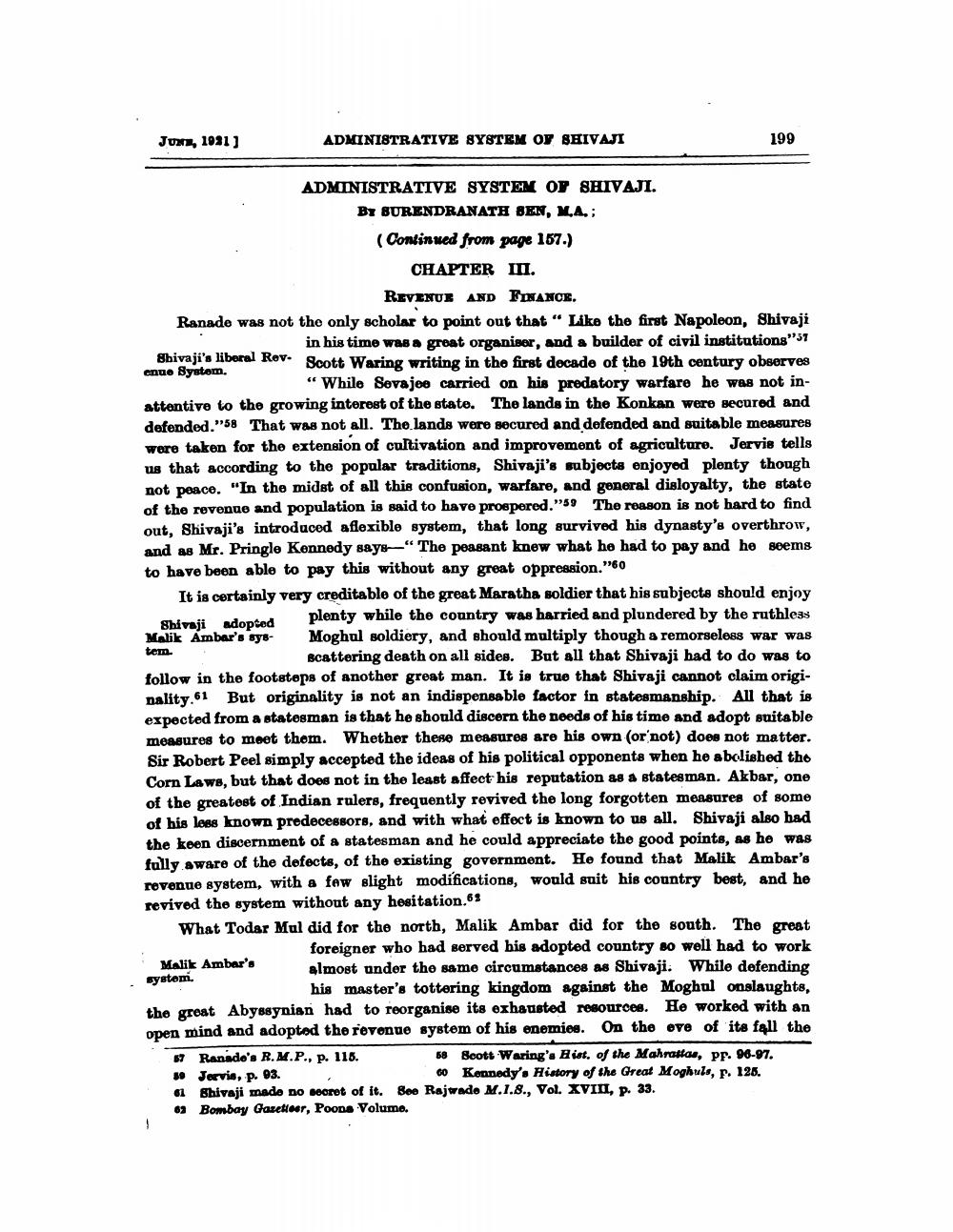________________
JUNE, 1921]
ADMINISTRATIVE SYSTEM OF SHIVAJI
Shivaji adopted Malik Ambar's sys
tem.
ADMINISTRATIVE SYSTEM OF SHIVAJI. BY SURENDRANATH SEN, M.A.: (Continued from page 157.)
CHAPTER III.
REVENUE AND FINANCE.
Ranade was not the only scholar to point out that " Like the first Napoleon, Shivaji in his time was a great organiser, and a builder of civil institutions"57 Shivaji's liberal Rev. Scott Waring writing in the first decade of the 19th century observes enue System. "While Sevajee carried on his predatory warfare he was not inattentive to the growing interest of the state. The lands in the Konkan were secured and defended."58 That was not all. The lands were secured and defended and suitable measures were taken for the extension of cultivation and improvement of agriculture. Jervis tells us that according to the popular traditions, Shivaji's subjects enjoyed plenty though not peace. "In the midst of all this confusion, warfare, and general disloyalty, the state of the revenue and population is said to have prospered."59 The reason is not hard to find out, Shivaji's introduced aflexible system, that long survived his dynasty's overthrow, and as Mr. Pringle Kennedy says "The peasant knew what he had to pay and he seems to have been able to pay this without any great oppression."60
It is certainly very creditable of the great Maratha soldier that his subjects should enjoy plenty while the country was harried and plundered by the ruthless Moghul soldiery, and should multiply though a remorseless war was scattering death on all sides. But all that Shivaji had to do was to follow in the footsteps of another great man. It is true that Shivaji cannot claim originality.61 But originality is not an indispensable factor in statesmanship. All that is expected from a statesman is that he should discern the needs of his time and adopt suitable measures to meet them. Whether these measures are his own (or not) does not matter. Sir Robert Peel simply accepted the ideas of his political opponents when he abolished the Corn Laws, but that does not in the least affect his reputation as a statesman. Akbar, one of the greatest of Indian rulers, frequently revived the long forgotten measures of some of his less known predecessors, and with what effect is known to us all. Shivaji also had the keen discernment of a statesman and he could appreciate the good points, as he was fully aware of the defects, of the existing government. He found that Malik Ambar's revenue system, with a few slight modifications, would suit his country best, and he revived the system without any hesitation.62
Malik Ambar's system.
199
What Todar Mul did for the north, Malik Ambar did for the south. The great foreigner who had served his adopted country so well had to work almost under the same circumstances as Shivaji. While defending his master's tottering kingdom against the Moghul onslaughts,
the great Abyssynian had to reorganise its exhausted resources. He worked with an open mind and adopted the revenue system of his enemies. On the eve of its fall the
67 Ranade's R.M.P., P. 115.
59 Jervis, p. 93.
61 Shivaji made no secret of it. See 62 Bombay Gazetteer, Poons Volume.
58 Scott Waring's Hist. of the Mahrattas, pp. 96-97. 60 Kennedy's History of the Great Moghuls, p. 125. Rajwade M.1.8., Vol. XVIII, p. 33.




